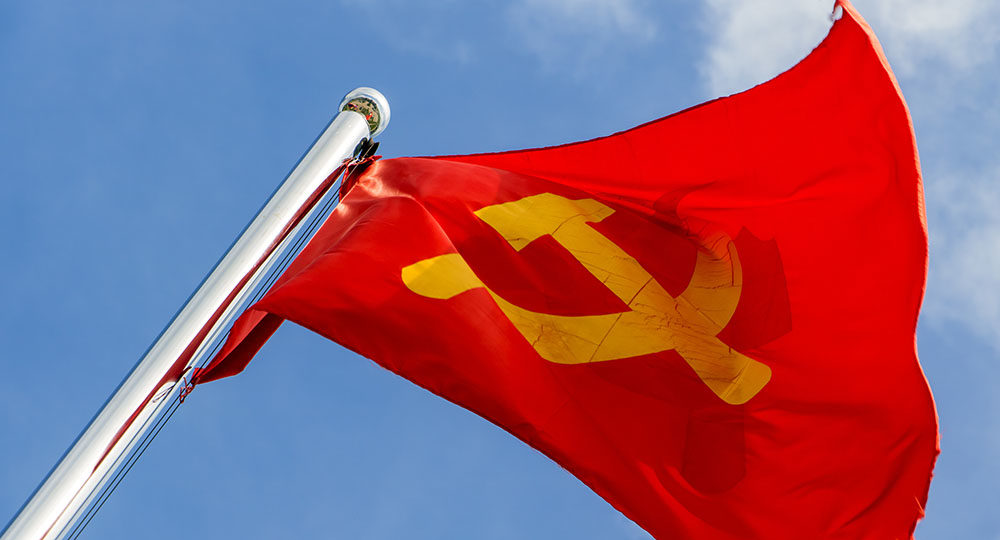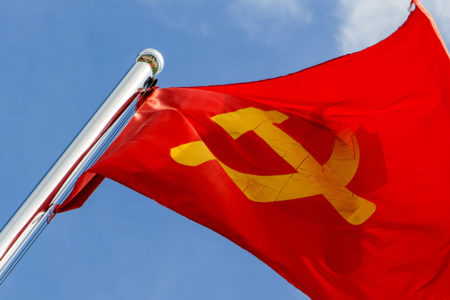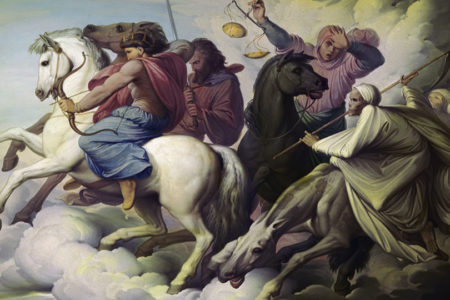Emerging Shadows of the Hammer and Sickle
What do you fellows intend to preach about Ezekiel 38, since Communism is dead and the Soviet Union is no longer a threat to anyone? It doesn’t even exist. You’ve got a lot of explaining to do.
The question was put to me after I had finished bringing a prophetic message at a conference in the spring of 1992. The Soviet Union had disintegrated in December 1991 and was supposedly on the road to freedom and democracy. The new Russia, we were told, would be more an ally than an enemy.
My answer to my inquisitor was, “It isn’t over yet.”
I confess that I answered with confidence. First, a last-days attack on Israel from “out of the far north” (Ezek. 38:15), a region clearly associated with Russia, is an integral part of the last-days scenario portrayed in God’s Word. Articulating that fact as biblical, prophetic revelation was neither sermonizing from the newspaper nor building eschatology from a current-events manual.
Yet there was also another, quite compelling reason for my confidence: Russia is essentially imperialistic. Imperialism is the driving force behind Russia’s political, social, and religious regional and global considerations. And though this hunger for power may lie dormant from time to time, it will inevitably come to the fore.
It was folly to believe that, although bankrupt and dispirited after the Soviet breakup, Russia would be content to ride in the backseat of the global political limousine and exist on the largesse of the Western nations. What is currently taking place is bearing this fact out.
Heady Days and Hopeful Hearts
On June 8, 1982, President Ronald Reagan delivered his famous “evil empire” speech before the British House of Commons. He said in part,
If history teaches anything, it teaches self-delusion in the face of unpleasant facts is folly. We see around us today the marks of our terrible dilemma—predictions of doomsday, antinuclear demonstrations, an arms race in which the West must, for its own protection, be an unwilling participant. At the same time we see totalitarian forces in the world who seek subversion and conflict around the globe to further their barbarous assault on the human spirit. What, then, is our course? Must civilization perish in a hail of fiery atoms? Must freedom wither in a quiet, deadening accommodation with totalitarian evil?
The president understood much better than most the issues and potentially painful alternatives we must employ in the interests of international stability or, for that matter, survival.
Five years later, on June 12, 1987, Mr. Reagan stood before the Brandenburg Gate in what was then West Berlin and issued a challenge bordering on an ultimatum to then Soviet leader Mikhail Gorbachev:
General Secretary Gorbachev: If you seek peace, if you seek prosperity for the Soviet Union and Eastern Europe, if you seek liberalization: Come here to this gate! Mr. Gorbachev, open this gate! Mr. Gorbachev, tear down this wall!
On June 13, 1990, hammers began to pound away at the infamous Berlin Wall that had held East Germans cap-tive since its construction in 1961. Opening the gates and destroying the wall, a symbol of the Cold War between the Soviet Union and the West, caused optimism to soar. And as families embraced and the barrier collapsed, optimism seemed well justified. Two words characterize the benefits of the breakup of the Communist Soviet empire: egress and access.
For millions of Jewish people long oppressed behind what Winston Churchill dubbed the “Iron Curtain,” the dissolution of the Soviet Union brought a golden opportunity to leave it. Thus in the 1990s, a mass exodus got under way and saw hundreds of thousands of Jewish people immigrate to Israel and other Western nations. The Jewish people’s massive exit brought ancient images to mind of Israelites fleeing from Egypt under Moses. This modern exodus, however, was led by men like Siberian gulag survivor and Soviet dissident Natan Sharansky.
For Westerners, the Soviet collapse provided access to a people no longer under the cloak of secrecy woven by Karl Marx, Vladimir Lenin, and facilitated by Joseph Stalin and his despotic successors. The new Russia was destitute, bankrupt-ed by 70 years of corrupt Communist, socialist delusion. Consequently, no options existed for those picking up the pieces other than to put their hands out to the democracies in order to fend off anarchy and chaos.
Perhaps the greatest of all doors that swung open during this time was for Christians, particularly evangelicals. Finally they were free to enter the region and minister to a spiritually starving population. For decades the Soviets deliberately excluded God as they passionately pursued their socialist, secular excursion into an atheistic nirvana, a state Webster’s Dictionary rightly defines as “a goal hoped for but apparently unattainable.”
What the Communist commissars failed to account for was the human heart’s inherent instinct to worship, to experience some link to the eternal. Predictably, when the opportunity to hear divine truth became available, floodgates of desire opened; and opportunities abounded. The fields were ripe, and the harvest was abundant.
Shadows of the Past
But in all of this, there remained an unsettling political, social, and religious reality that would eventually have to be reckoned with. To remain a client state for the long haul was never something Russia saw as a viable option. After all, the Soviet empire had been a major player on the world stage. Power, prestige, massive territories, and fearsome military power caused continual international apprehension, as nations tried to ascertain what the Russian “bear” would do next.
The Soviets hated everything democracy stood for. They despised evangelical Christianity. They had evicted the God of the Judeo-Christian world. And anti-Israel/anti-Semitic militancy ranked high on their list of preferred national pastimes.
At one critical juncture in the Soviet-Israel standoff, Moshe Dayan, the famous Israeli general and political leader, was quoted as saying, “The key to war in the middle East is in the hands of the Soviets, while the key to peace is held by the United States.”
Those words succinctly articulated the essence of the major issues during the not so Cold War.
A few facts about arms agreements with Israel’s archenemies exhibit Arab and Soviet intentions in the Middle East extremely well.
Soviet Arms Agreements
| Agreement Year | Country Aided | Extent of Soviet Aid |
|---|---|---|
| 1955 | Egypt | Main Supplier |
| 1955 | Syria | Main Supplier |
| 1958 | Iraq | Main Supplier |
| 1962 | Algeria | Main Supplier |
| 1967 | Sudan | Main Supplier |
| 1967 | Iran Terrorists | Partial Supplier |
| 1970 | Libya | Partial Supplier |
The ‘Bear’ Begins to Stir
Early this year, Russia began a serious Middle East venture designed to reassert its influence. In a deal with the besieged outlaw Syrian government, the Russians cancelled most of Syria’s $10 billion debt and, in a formal declaration, jumpstarted their once intimate relationship. That cozy alliance began in the Cold War days of the mid-1950s and came to a halt only with the collapse of the Soviet Union a decade ago.
For their part, it is a big win for Bashar Assad and Syria. Assad regains an ally that will presumably protect it from the United States and patronize it in the international arena.
What’s in it for Russia? Orly Halpern of The Jerusalem Post tells us:
Russia’s ambitions are growing to Soviet-era size. It wants to be involved in the international games that are now the recreation of the European Union and the United States. But the US is not letting it get involved in the Arab-Israeli conflict, and it has little to say in the Iraq issue because it refused to make war on a country that owed it so much money.
By renewing political and military relations with countries the US has blackballed, the downsized former superpower aims to bring back the glory of its Soviet-era days when it played countries like chess pieces.1
To add to Israel’s and the United States’s reasons for concern, the Russians have reportedly agreed to sell advanced missiles to Syria. Israeli Prime Minister Ariel Sharon protested to Moscow that such missiles could fall into the hands of terrorists and gravely endanger Israel. Given Syria’s track record, one can virtually be assured this will be the case.
Another cause for consternation is the agreements Russia has made with the Iranians to assist them in further developing their nuclear program. Although the Russians claim they will only help Iran achieve the ability to produce nuclear generating power, the West worries that this totalitarian successor to the ambitions of deposed Iraqi despot Saddam Hussein has other plans in mind.
Furthermore, the new Palestinian leader Mahmoud Abbas [Abu Mazen] made every effort to make sure his first trip abroad was to Moscow. He did so, he said, to demonstrate the respect the Palestinian people feel toward the Russians and their role as major players on the world scene, particularly in the Middle East.
On January 13, 20 members of Russia’s Duma (lower house of parliament) sent a letter to the prosecutor general asking him to investigate their allegations and, if confirmed, to initiate proceedings prohibiting all religious and ethnic Jewish organizations in Russia, branding them as “extremist.”
They argued that the Jewish people are the cause of the anti-Semitism that has reemerged in the country in recent years. The charge is hauntingly reminiscent of the threadbare, but too often effective, lies that instigated the vicious “blood libels” and Protocols of the Learned Elders of Zion, which have served Russian anti-Semites so well in the past.
Evangelical Christians in Russia and some of the commonwealth states are also feeling the heat. It is no secret that the Russian Orthodox hierarchy is in a huff over the giant inroads Bible-believing Christians are making among a spiritually emaciated people long stifled by the sterile formalism of the Orthodox system. Consequently, the Russian Orthodox have forged alliances with some of Russia’s most radical political groups, branding evangelicals as cultists who prey on unsuspecting citizens. Of most concern is that evangelical churches, once unregistered and “under-ground” during Communism, are now in the open and are exposed targets for the anti-Christian establishment, should the hammer of hate fall once again.
Perilous Times, Desperate Measures
We have long been warned that in the last days perilous times would come upon the face of the planet. For all but those who persist in maintaining a debilitating state of spiritual hibernation in order to avoid the facts, that time is upon us. The great powers are moving inexorably toward the final convulsions prewritten in the Scriptures. What we have described as developing in the North in the prophetic scenario is merely one piece of the puzzle.
And though some may argue that the words desperate measures should not be used to describe what Jesus’ followers must take in response to the crisis, no one can argue the legitimacy of the desperate need to buy up the time and make a difference; time is most assuredly of the essence.
Someone once said, “The only juncture where time and eternity meet is at this moment.”
Think about it. If that is true, it makes what we do for the cause of Christ at this moment the great imperative of our lives. Face it. Our moments to touch eternity are running out.
ENDNOTE
- Orly Halpern, “Analysis: Russia’s ambitions grow-ing,” The Jerusalem Post, January 27, 2005 [www.jpost.com/servlet/Satellite?pagename=JPost/JPArticle/ShowFull&cid=1106796046758].







